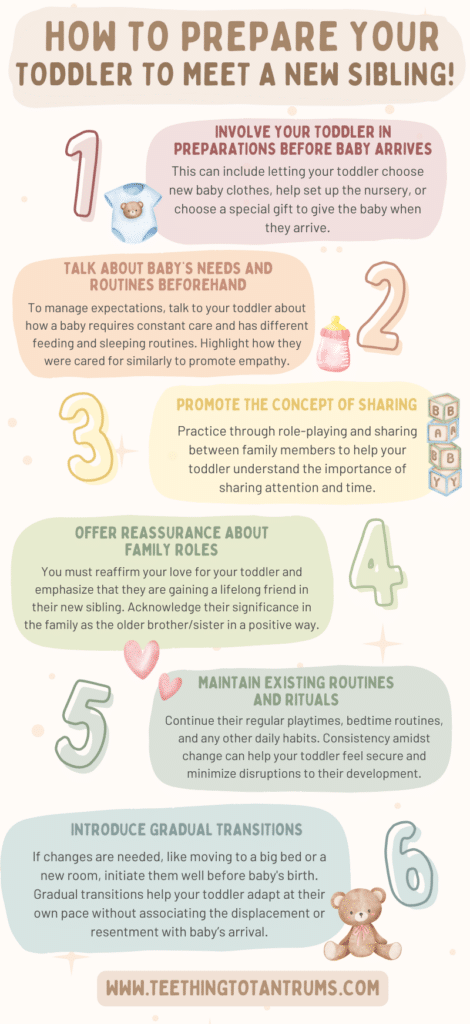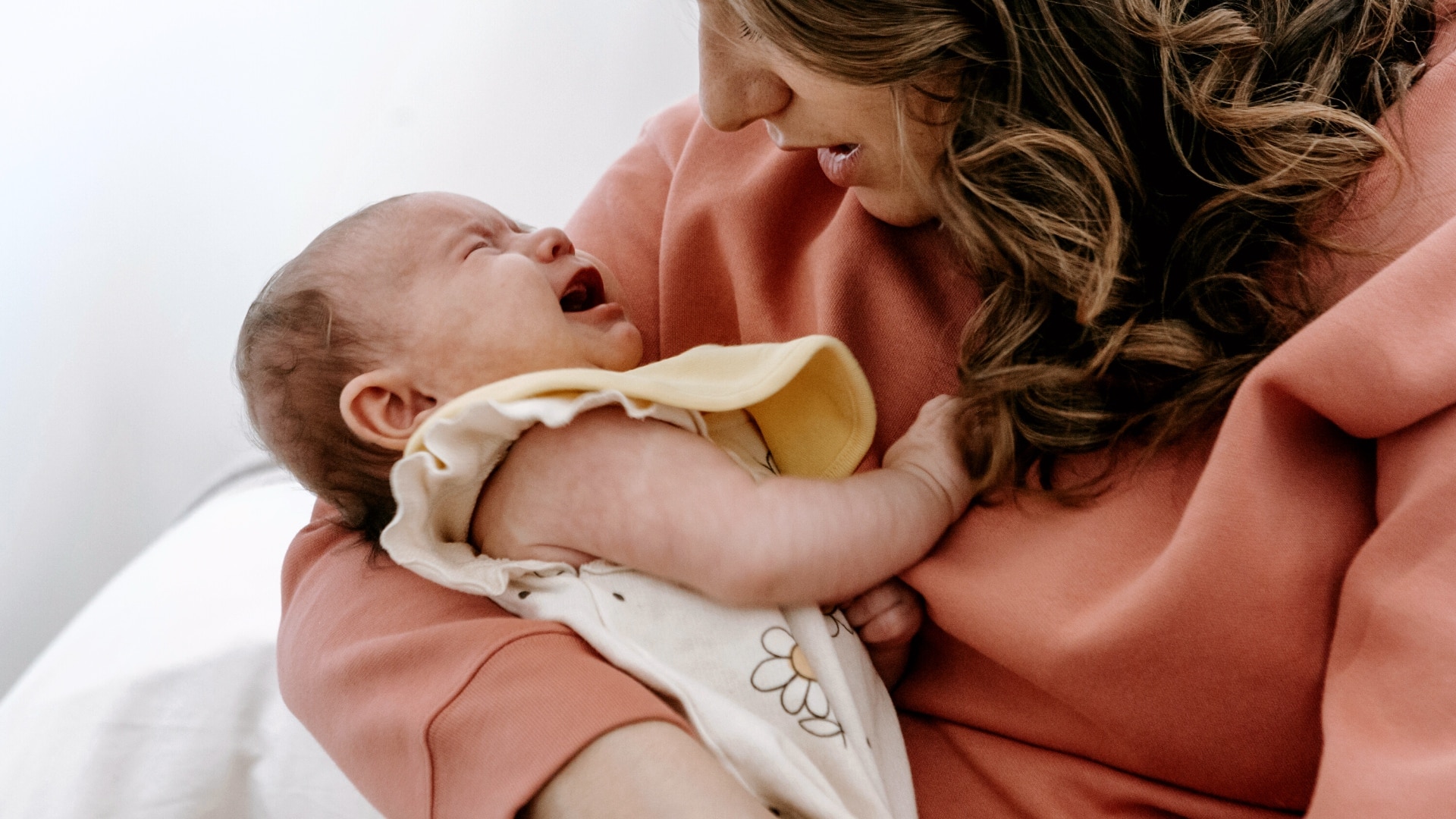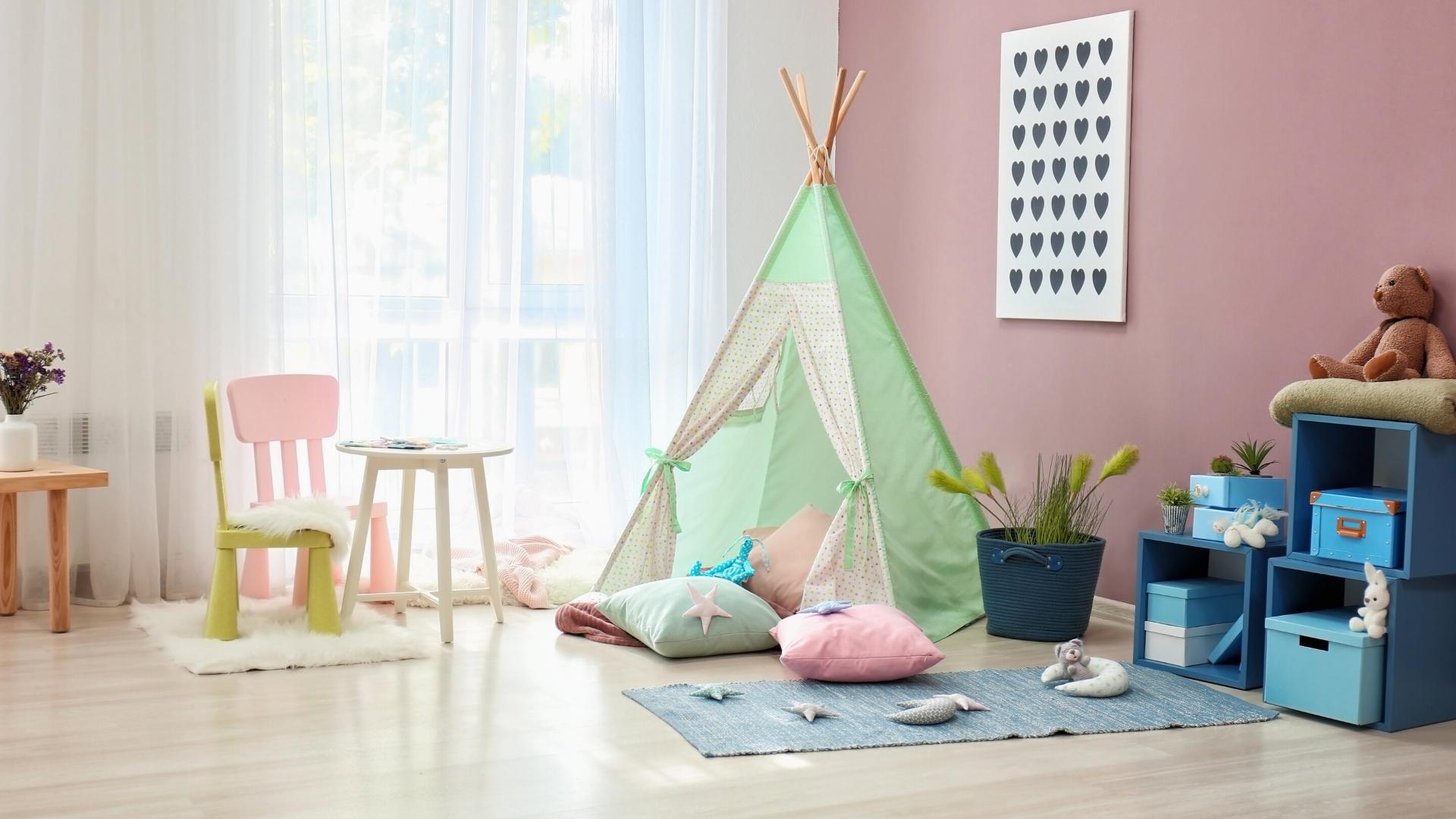While you are excited about the new addition to your family your toddler may not be so keen to share you with someone else!
So, the delicate process of introducing the concept of a new baby to your toddler and how you prepare your toddler for a new baby can make all the difference to this new family dynamic.
In today’s post, I will share my top tips and tricks to help the arrival of a new sibling go as smoothly as possible – planting the seeds for your children to be friends for life

Table of Contents
When To Talk To Your Toddler About A New Baby
When deciding when to talk to your toddler about a new baby, you must approach the situation with care and timing that is appropriate for your toddler’s capacity to understand.
Typically, I would suggest discussing the new baby’s arrival early in the second trimester, after the first ultrasound, when you have pictures and a clearer idea of the pregnancy’s progression.
This time frame allows your toddler to gradually adapt to the idea of becoming a big brother or sister before baby is due.
Try to naturally bring the new baby up in conversation, by inviting them to feel the baby kick or asking for their help picking out baby supplies.
Having your toddler involved in baby preparation will foster a sense of excitement and make them feel part of the whole process – a very positive association we want to develop!
How To Prepare Toddler For A New Baby: 6 Easy Steps
So how can you make the journey towards becoming an older sibling enjoyable and exciting for your toddler?
Most importantly, you should keep your toddler involved in discussions about your pregnancy, how there might be family changes, and their role when the baby arrives. You must emphasize the positives of being an older sibling too.
Here are some things you can do to help prepare your little one for the arrival of a new sibling:

- Involve Your Toddler in Preparations Before the Baby Arrives. Encourage your toddler’s involvement by letting them help with setting up the nursery or choosing baby clothes. This fosters a sense of involvement and helps your toddler understand that a new family member is coming. Simple tasks build anticipation and can help to lay the groundwork for a positive sibling bond.
- Discuss the New Baby’s Needs and Routines. Talk to your toddler about how a newborn requires constant care and has different routines, including feeding and sleeping. Highlight how they once were cared for similarly to promote empathy. This may help in managing expectations and reducing potential behavioral issues stemming from jealousy.
- Promote the Concept of Sharing. Teach your toddler the importance of sharing attention and toys with their new sibling. Practice through role-playing and sharing between family members can also be helpful in preparation for when your toddler will have to share your attention and time.
- Offer Reassurance About Family Roles. You must reaffirm your love for your toddler and emphasize that they are gaining a lifelong friend in their new baby brother or sister. Acknowledge their significance in the family as the older sibling in a positive way. This can bolster their self-esteem during the development of their new role. However, be wary of not overwhelming them with the responsibility.
- Maintain Existing Routines and Rituals. Keeping your toddler’s routines as consistent as possible will provide stability in the lead-up to the new arrival. Continue their regular playtimes, bedtime routines, and any other daily habits. Consistency amidst change can help your toddler feel secure and minimize disruptions to their development.
- Introduce Gradual Transitions. If you want to have your toddler potty trained, moved into a big bed, moved into their own room, or attend daycare for a couple of mornings a week to make life more manageable when the new baby arrives… I highly recommend starting these changes AT LEAST 2 months before baby is due. This will allow you to give your toddler the support they need and prevent them from negatively associating these big changes with their sibling’s arrival.
Looking to get your little one to sleep quickly and effortlessly? Check out my Bedtime and Nap Cheat Sheet and master the art of making daytime naps and bedtimes as seamless as possible.
A bedtime & nap cheat sheet so good your little one will ask you to put them to bed...
Laura Williams "This is a life saver! I'm so glad I downloaded your bedtime & nap cheat sheet. My little one actually asked me to put him to bed last night! Unbelievable! Thank you so much!"
Click Here For The FREE Cheat Sheet
Managing Your Birth With Young Children
Having a plan for when you go into labor is key in ensuring your toddler is not alarmed or left feeling scared and uncertain about what is happening.
- Explain to your toddler that you will need to be away for a short while when the baby is ready to come and explain exactly who will be looking after them.
- Plan visits to the pediatrician with your toddler; involve them in the process. This fosters a sense of involvement and helps in adjusting to the new family dynamics.
- Identify a trusted family member or friend who will look after your child and ensure they spend some one-on-one time with this person before the birth so that your toddler is emotionally ready to be left alone with them.
- Your toddler needs to remain in familiar surroundings with a known caregiver so if they are going to be staying with them while you are away you should plan some sleepovers at your chosen friend or family’s house beforehand. Alternatively, have your trusted family member or friend come and look after your toddler at home where everything is familiar to them.
It is important that you explain this big event in a way your toddler can understand.
TOP TIP: Using books to help your toddler understand the whole process from you being pregnant to the arrival of the new baby and how it feels to be an older sibling is a great way to promote discussion and help you explain all aspects of the big event. At the end of this post, you will find a list of my favorite books for dealing with this important milestone. Click here to jump to them now.
How To Introduce Your Toddler To Their New Sibling
When the time comes to introduce your toddler to their new sibling, some will be super excited while others may seem unsure.
To make this process run as smoothly as possible, begin with open conversations about what it means to have a new family member. Use terms like “big brother” or “big sister” to foster a sense of pride and involvement.
You can also try the following 3-step introduction… I have used this technique at various times throughout my nannying career and have always had great success with it:
- Gift Exchange: Introduce the idea of a gift exchange between your toddler and new baby. A small present from the toddler to the new baby can create a welcoming first interaction. Similarly, have a gift for the toddler that’s from the baby to encourage a positive association. This can be a simple toy or book; something to celebrate their new role in the family. 🎁
- Encourage Interaction: Demonstrate how they can interact safely with their new sibling. Show your toddler how to gently touch and talk to the baby, perhaps with the help of a doll before the baby arrives. When the baby is born, supervise their first interactions, guiding them on gentle ways to interact, like softly stroking the baby’s foot. Try not to say negative things like “don’t do that”… Instead, explain and show how to handle the baby in a positive and gentle way. 💕
- Establish Special Time: Emphasize that your toddler will still have one-on-one time with you. Assure them that the arrival of a new sibling won’t take away your love or attention. Plan for special times with just the two of you, even if it’s a short storytime, to reassure them that they are still a crucial part of the family dynamic. 📚
Bringing Baby Home
When your new baby arrives, your home will undoubtedly become a hub of new routines and adjustments, and your toddler no matter how well-prepared will need support to understand these changes.
To prevent jealousy from developing I would always advise involving your toddler in caring for the newborn as much as possible.
I know this may sound like a lot of extra hard work but a tantrum-throwing toddler and a screaming baby are far harder to deal with than just taking time and patience to include your toddler in the care of your newborn.
The involvement does not need to be large – helping with diaper changes or fetching supplies for breastfeeding are all wonderful roles to get a toddler involved in the care of your new baby.
You can also do the following to keep peace within your home with a new sibling dynamic:
- Establish a routine that includes time alone with your toddler. Even short periods of one-on-one time can strengthen your bond.
- Take time to play or read with your toddler while baby naps. I am a great advocator for getting toddlers to help around the house as you do your chores. Trust me your little one will be happy to sort laundry or help with some other task if you are doing it together and having fun.
- Arrange with your partner that you put your toddler to bed on certain nights so they do not feel neglected when baby is here. If there were other things you used to do together try to build them into your routine as often as possible.
- Set clear visitor guidelines to maintain a calm environment. Explain to visitors the importance of acknowledging your toddler, not just the new baby and encourage them to ask the toddler about the baby and include them in conversations when they visit.
- Prepare a special area for your toddler to play in while you tend to the newborn. This will help your toddler feel they have their own space in the home.
- Remain consistent with discipline and routines to provide a sense of security for your toddler. This may be quite difficult, especially if your toddler is struggling with the new arrival, but being firm but kind is your best policy and it is important not to let bad behavior happen just because you feel sorry for your toddler.
- During breastfeeding, have quiet activities ready for your toddler to enjoy nearby. It’s an opportunity for them to be close while understanding that the baby needs attention too. Books and puzzles are my go-to toys.
These classic 24-piece wooden puzzles are easy to grasp, lift and fit together to create bright scenes of the ocean, being on safari and walking among dinosaurs! Perfect for a quiet afternoon toddler activity, these puzzles will be a wonderful addition to any toy box.
NOTE: Realistically your toddler will probably struggle with the arrival of a new sibling, but these emotions are completely normal. Acknowledge your toddler’s feelings and assure them they are just as loved as before. Rest assured that these tricky moments will pass and that you’re doing everything you can to give love and support to your children.
What To Do If Your Toddler Becomes Jealous Of A New Baby
Despite your best efforts, some toddler will experience jealousy of their new sibling. However, this is a perfectly natural emotion for toddlers when a new baby arrives and signals their need for attention and reassurance.
To help your older child adjust and reduce feelings of envy, involve them in activities with the new sibling.
- Assign them simple and safe tasks like singing to the baby or fetching a diaper. This inclusion fosters a sense of responsibility and bolsters their self-esteem. You can also employ positive reinforcement to encourage gentle and caring behaviors toward their new sibling.
- Understanding and managing your toddler’s emotions is pivotal. Empathize with their feelings and acknowledge the big change in their life.
- Communicate with your toddler often, offering them your undivided attention when possible. And establish one-on-one playtimes to reassure them that they are still important and loved.
- Keeping your toddler’s routine consistent is crucial. It provides stability in a time of big transitions.
If jealousy results in rough behavior, calmly explain to your toddler why gentle actions are necessary. Try to avoid removing them from the room or shouting. Rather show them how to handle the baby and encourage them to do the same.
If they are still rough, explain that they need to go and sit in the quiet corner until they are ready to come back and be gentle.
Will My Older Child Have A Sleep Regression When The Baby Comes Home?
When you bring a new baby home, there is a strong possibility your older child will experience disruptions in their sleep. This is often referred to as sleep regression.
It’s a time when your toddler might struggle with sleep habits they previously mastered. They might wake up more frequently during the night or resist going to bed.
The arrival of a new sibling changes the daily routine, which can upset your older child’s sense of normalcy.
They may seek attention during the night, a time when you’re occupied with the newborn. Be prepared for potential changes in your older child’s sleep patterns.
Tips to help your older child adjust:
- Maintain established bedtime routines as much as possible.
- Introduce any big changes, like a new bed, several months before the baby arrives.
- Spend quality one-on-one time with your toddler to reassure them of your love and attention.
- Stick to their normal bedtime routine and have someone look after the new baby so that this can still be a special one-on-one time for your toddler.
During this time, keep a few things in mind:
- Do not scold your child for nighttime wakefulness.
- Gently guide them back to bed with minimal interaction.
- Keep the night environment calm and comforting.
- Try not to form bad sleep habits like bringing the toddler into your bed.
TOP TIP: If possible, discuss with your partner who will deal with your toddler’s nighttime wakings. Getting them to do the bedtime routine with your toddler well before baby arrives can also help in keeping consistency when baby arrives.
My Top Sibling Book Recommendations
I am a great fan of using books to help young children deal with important milestones and the arrival of a new baby brother or sister is an ideal opportunity to use stories to help your toddler embrace the concept of a new baby.
They can help your child grasp their new role, deal with jealousy and uncertainty about the impending change, and adjust to the family’s changing dynamic.
Here are some top picks for your family:
- “How to Welcome a New Baby” by Jean Reagan. This book provides tips in a gentle way for an older child to embrace their new role in the family. It’s a simple read that promotes bonding between siblings right from the start.
- “The New Small Person” by Lauren Child. A story that touches upon the mixed feelings a toddler may have about a new baby entering the home. The book’s illustrations and narrative encourage positive family dynamics, emphasizing understanding and acceptance.
- “Big Brothers Are the Best” by Fran Manushkin. This book tackles important areas like feeding, naps, and how an older sibling can assist in caring for a baby. By emphasizing the role of a big brother, this book helps a toddler prepare for and adjust to having a sibling.
- “You’re The Biggest” by Lucy Tapper. A delightful, beautifully illustrated hardback picture book for a new sibling celebrating their role as the biggest, following the arrival of a new baby. With gorgeous color illustrations, the story follows two charming foxes on a wonderful journey, discovering the unique role of an older sibling. Promoting involvement and acceptance, the book starts with ‘When the baby arrived your very important job began’ and guides your toddler on the special reasons why being a big brother or sister is so rewarding.
Reinforcing the family bond while preparing for a new baby can be an enjoyable and proactive experience when the right resources are at hand.
Frequently Asked Questions About Preparing A Toddler For A New Baby
This section provides clear answers to common concerns about integrating a toddler into the new family dynamic with a baby.
Q: How long does it typically take for a toddler to adapt to a new baby in the family?
A: Every toddler is unique, and their adjustment period to a new baby can vary. It may take a few weeks to several months for a toddler to fully adapt depending on their personality and maturity. During this time, it’s crucial for you to recognize and validate your toddler’s feelings. Patience and consistent reassurance are key to helping them through this transition period.
Q: Are there specific activities to help a 1.5-year-old understand the arrival of a new sibling?
A: Yes, there are activities designed to aid understanding at this tender age. Reading books about new siblings can be very effective. You can also involve them in preparing the baby’s room or selecting clothes for their new sibling. Simple, age-appropriate responsibilities will help them feel connected to the baby before the arrival.
Q: How do I manage the daily schedule with a toddler and a baby?
A: Aim to maintain your toddler’s routine as much as possible to provide stability and try to synchronize the baby’s feeding times with your toddler’s activities or nap times. Always have engaging, independent play options available for your toddler when you need to attend to the baby.
Q: How do you have bedtime with 2 children?
A: Establishing a consistent bedtime routine for both children will be a game-changer for your parenting journey. You might start with baby’s bedtime and then proceed to your toddler’s, allowing for some one-on-one time with each child.
Alternatively, simultaneous bedtimes can work if you create a ritual that includes both, like a shared storytime. Help from your partner can also be a huge advantage with each of you taking turns to deal with each child. Try and keep to your toddler’s bedtime schedule as much as possible and be prepared for some bedtime battles.
Q: Is there an ideal age gap between siblings?
A: There is no universally ideal age gap between siblings, as factors such as personal, financial, and emotional readiness play a crucial role. However, a gap of 27-32 months can reduce competition for attention as children age.
Need More Parenting Help?
- Download our FREE Bedtime & Nap Sleep Cheat Sheet. It’s a free, easy-to-use and proven formula designed for parents of 0-5 year olds to master the art of consistently undisturbed and restful sleep without the yelling, nagging or exhausting long-winded evenings.
- Check out our Parenting Toolbox. You’ll get access to expertly-chosen products that you can guarantee are the best for your little one and your wallet.
- Are you looking for personalized guidance to navigate the challenges of parenting? I offer 1-on-1 consultations to bring you tailored strategies and actionable advice to help support your child's growth and well-being with confidence.

A bedtime & nap cheat sheet so good your little one will ask you to put them to bed...
Laura Williams "This is a life saver! I'm so glad I downloaded your bedtime & nap cheat sheet. My little one actually asked me to put him to bed last night! Unbelievable! Thank you so much!"
Click Here For The FREE Cheat Sheet



